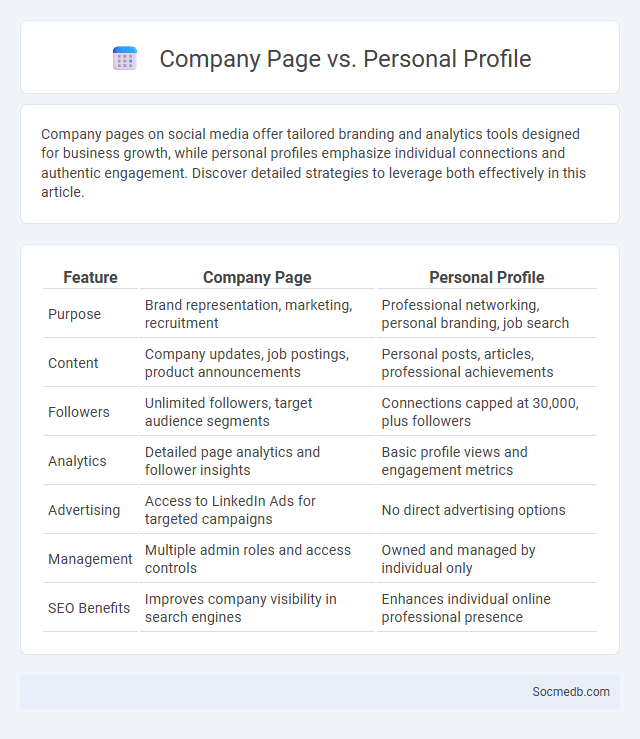
Photo illustration: Company Page vs Personal Profile
Company pages on social media offer tailored branding and analytics tools designed for business growth, while personal profiles emphasize individual connections and authentic engagement. Discover detailed strategies to leverage both effectively in this article.
Table of Comparison
| Feature | Company Page | Personal Profile |
|---|---|---|
| Purpose | Brand representation, marketing, recruitment | Professional networking, personal branding, job search |
| Content | Company updates, job postings, product announcements | Personal posts, articles, professional achievements |
| Followers | Unlimited followers, target audience segments | Connections capped at 30,000, plus followers |
| Analytics | Detailed page analytics and follower insights | Basic profile views and engagement metrics |
| Advertising | Access to LinkedIn Ads for targeted campaigns | No direct advertising options |
| Management | Multiple admin roles and access controls | Owned and managed by individual only |
| SEO Benefits | Improves company visibility in search engines | Enhances individual online professional presence |
Understanding Company Pages, Personal Profiles, and Connections
Company Pages serve as official brand representations, showcasing products, services, and updates to engage a targeted audience. Personal Profiles reflect individual identities, enabling you to share experiences, professional achievements, and build authentic relationships. Connections form the network links between profiles, facilitating communication and collaboration that enhance your social influence.
Key Differences Between Company Pages and Personal Profiles
Company pages on social media primarily serve to promote brands, products, and services, offering tools for analytics, advertising, and audience engagement tailored for business growth. Personal profiles focus on individual expression, social connections, and personal content sharing without advanced marketing features or performance metrics. Company pages allow multiple administrators and provide access to customizable call-to-action buttons, which are not available on personal profiles.
Purpose and Benefits of a Company Page
A company page on social media serves as a strategic platform for brand visibility, customer engagement, and reputation management. It provides a centralized space for sharing product updates, industry insights, and promotions, fostering trust and loyalty among target audiences. Leveraging analytics from the page enhances marketing strategies by identifying consumer behavior and optimizing content for higher conversions.
Personal Profile: Building Your Professional Brand
Your personal profile on social media serves as a powerful tool for building your professional brand by showcasing your skills, accomplishments, and unique value proposition. Optimizing every section with relevant keywords and achievements helps attract potential employers, clients, or collaborators searching for your expertise. Consistently sharing insightful content and engaging with industry leaders amplifies your visibility and establishes your authority in your field.
The Role of Connections in Networking
Connections on social media platforms significantly enhance networking opportunities by facilitating direct interaction with industry professionals, thought leaders, and potential collaborators. Building a robust network through meaningful engagements, such as sharing insights and participating in discussions, fosters trust and credibility essential for professional growth. Leveraging connections enables access to exclusive information, job opportunities, and collaborations that drive career advancement and business success.
Content Strategies for Company Pages vs Personal Profiles
Company pages on social media benefit from content strategies that emphasize brand consistency, targeted advertising, and analytics-driven posts to engage specific demographics and boost conversions. Personal profiles thrive with authentic storytelling, frequent interactions, and personalized content that builds trust and fosters meaningful relationships. Leveraging tailored strategies for each, companies maximize reach and engagement by aligning messaging with audience expectations and platform algorithms.
Audience Engagement: Company Page vs Personal Profile
Audience engagement on social media differs significantly between company pages and personal profiles due to content authenticity and algorithm preferences. Personal profiles tend to generate higher interaction rates because users perceive posts as more genuine and relatable, resulting in increased likes, comments, and shares. Company pages benefit from targeted advertising and analytics tools, enabling precise audience segmentation and strategic content delivery to drive engagement metrics effectively.
Analytics and Performance Tracking
Social media analytics enables you to measure key performance indicators such as engagement rate, reach, and conversion metrics to optimize your digital strategy. Tracking performance through platforms like Facebook Insights, Twitter Analytics, and Google Analytics helps identify audience behavior and content effectiveness. Utilizing data-driven insights allows your brand to enhance ROI and tailor campaigns for maximum impact.
Best Practices for Leveraging All Three Features
Optimizing social media engagement requires strategically leveraging posts, stories, and reels to maximize reach and interaction. Posts provide lasting content that fuels brand identity and SEO, stories offer real-time engagement and exclusivity through ephemeral updates, and reels boost discovery by tapping into trending audio and visual effects for viral potential. Consistent use of hashtags, compelling visuals, and audience interaction across these features amplifies visibility and drives organic growth on platforms like Instagram, Facebook, and TikTok.
Choosing the Right Approach for Your Business Goals
Selecting the optimal social media strategy hinges on your business goals, whether increasing brand awareness, driving sales, or enhancing customer engagement. Understanding target audience demographics and platform-specific features enables you to tailor content that resonates and maximizes ROI. Consistently analyzing performance metrics ensures your approach evolves with market trends and business needs, securing sustained success.
 socmedb.com
socmedb.com